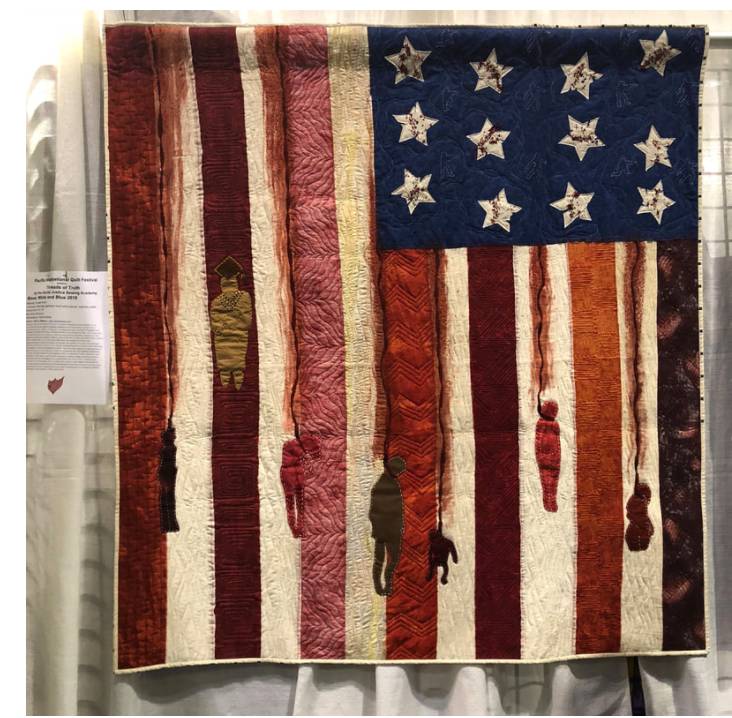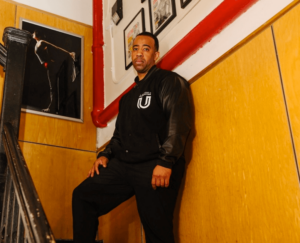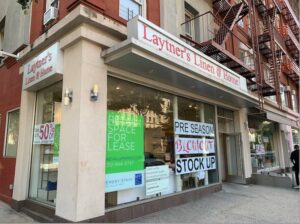While hundreds of thousands of Americans took to the streets this summer to rally against police violence and racial injustice, Sara Trail and her crew of Social Justice Sewing Academy Ambassadors staged their own form of protest, by picking up needles and thread. With scraps of new and used fabric – sometimes clothing from a deceased person of color – in a range of textures and hues, they stitched out intimate, material sound bites of the injustice and unrest that have marked their young lives. The fruits of their labor: stunning quilts, remarkable for their artistry, but even more so, for their emotional depth and eloquence. From incidents like the murders at Marjory Stoneman Douglas High School to a textile rendering of the “dichotomous history of the American flag”, each crafted piece gave full expression to voices and stories, long overlooked, repressed, or ignored.
Sara Trail has been speaking out – and encouraging others to do the same – since childhood. SJSA, which she founded in 2017, is just her latest initiative. Despite its innocuous mission “to support and encourage the growth and development of emerging artivists through sewing, education, and community”, the organization – like Trail, herself – can set many on edge in the unfiltered lens it uses to scrutinize the world around us. Trail’s social media accounts, which act as a gallery for her students’ work, are often lightning rods for racist comments as a result. She is frequently hounded with slurs about her presumed misappropriation of quilting for political purposes, as well. The 25-year old craftivist seems unfazed. [quote from Sara]
Trail was born and raised for nine years in Chicago. Both her her parents were civically engaged and part of a tight circle of leading Black activists in the city. As a kid, Trail had a front row seat to these friends and colleagues. “I grew up around Black power…around everyone from Chaka Khan, like Gladys Knight.” She casually mentions that Reverend Jesse Jackson, leader of the PUSH/Rainbow Coalition, a leading Black activist coalition, is her godfather. Her mom and dad taught Trail to be forceful but tactful in broadcasting her point of view, as did her godfather. “I never felt voiceless because I had parents who were teaching me. I could also call the Reverend and get some first-person civil rights stuff from someone who’s been beat up from dogs.”
When her family moved to Oakland, California in 2006, Trail became more of a social outcast. She was shuttled to strict Catholic schools in upscale parts of the Bay Area to receive the most cost-effective education her parents could find. For a young woman accustomed to radical modes of thought, the parochial curriculum was mind numbing. Her parents were quick with a complementary education of their own, though. “My parents really taught me how to categorize things so like, ‘Sara, you’re going to go to a Eurocentric whitewash school where they’re going to teach you how to read and write well. That’s it, don’t worry about you or the information, understand that there’s biases.’”
That training didn’t hold her back from instigating contentious classroom discussions in which she would try to extend the conversation to be more inclusive of other perspectives. Trail explains that typically, the end to any lesson would be that God saved everything. She would counter: “Okay, we can have a conversation then that God created slavery. Let’s talk about it because if Jesus wanted everything to be in this way, we got to put some accountability on humanity too.” The teacher would acknowledge her presence, most of the time, but never her request.
Trail says now that she was tolerated at these schools, but never really accepted. It was the same feeling she had during her lone after school activity, taking quilting lessons at a fabric chain store with, as she describes it, “a bunch of old [white] grandmas…who taught me how to paper piece and how to make double wedding rings.” As with many crafting circles, the activity lent itself to conversation. Given her comfort level with adults – she was also an only child – Trail was happy to join in. Her fellow quilters were not so receptive. “They’d call my mom and asked me to be picked up..I was thinking my mom just wanted to pick me up early but really they were calling to say that I was talking too much, that I needed to leave.”
The murder of Trayvon Martin in 2012 was a turning point for Trail. The parallels in the two 17- year-old’s lives rattled her, including the fact that they were born five days apart. She channeled her grief and outrage into quilting a portrait of the young man, giving full expression to her tangled emotions. Trail remembers the sewing class the weekend following Martin’s murder, when she was working on her piece. “I was trying to steer the conversation and talk about what we as quilters, as adults, as social citizens, are going to do about Trayvon being murdered…Everyone was kind of like, ‘Yeah, nothing.’ I think in that moment, that was the biggest divide of these are not my people.”
Trail quit the class, finished the quilt and tried to have it exhibited, as a catalyst for conversation. None of the traditional quilting venues would accept it. Police violence and needlework were not a combination any seemed comfortable with. So, Trail says, she pivoted: “I went to black spaces, I went back to Chicago to show it, I went to conferences and spaces that were intentionally talking about social and racial and anti-racism work. I went outside of the quilt world.”
She didn’t stop there. By the time she reached graduate school at Harvard’s School of Education, at the not-so-advanced age of twenty, she had an idea for something bigger: creating her own, multi-racial quilting space – part studio, part conversation pit, part business incubator – in the form of the Academy.
According to one of Trail’s professors at Harvard,
[insert comments and quotes from some of her professors at the Ed School who she credits with helping her shape and launch the Academy – both about her, the Academy, and the promise she showed]
Jackson: “disconnected it was just a rag but connected it became a quilt and a thing of beauty and art and culture and power with function.” Learning how to live together in a connected way,
Today, Trail and her growing community of stitchers are considered at the forefront of the next generation of grassroots, art-centric, radical activism. Many refer to them offhandedly as “craftivists” as originally defined by feminist and author Betsy Greer in her “Craftivism Manifesto.” In Greer’s own words, craftivism is “about raising consciousness, creating a better world stitch by stitch…It’s also about sharing ideas with others in a way that is welcoming, not dividing..creating wider conversations about uncomfortable social issues.” Pussy hats would probably not qualify. Nor would high end retailers like socialite Rachelle Hruska MacPherson whose big ticket tees at Lingua Franca seem more a passing trend of faux outrage and savvy merchandising than real commitment. It would be hard to imagine, after all, considering SJSA’s stunning pieces of heartfelt artwork in the same body of work as the $380 “We the People” sweaters hawked by MacPherson. Radical? Only in their price tag. MacPherson likes to think though, that she too is promoting social justice at her Soho outlet, no matter how distant the experience might be from her own life or how pricey her made-for-Madison- Avenue message. She broadcasts her presumed commitment to pay her embroidery staff a livable wage – somewhere between $20 and $27 an hour – even though it’s likely that it’s less than she and her contemporaries pay regularly to maintain their glossy highlights.
Trail herself doesn’t think of her work as craftivism as the label is limiting. She prefers the tag “artivist” with an emphasis not only on the non-gendered creative process but on the agendasetting, goal-achieving features fundamental to any legitimate political movement. “Crafts have the connotation of hobby,” she says, one typically attributable to women. “Men get to have art,” she adds. Trail also stresses that true activists, as their name would suggest, don’t just say there’s an issue and walk away. They take a stand and provoke change.
Comments from Jesse Jackson about Trail in the context of other Black activists.
Next section: Bryan, one of her early ambassadors – about his work and the Academy
Then Jocelyn and “building your brand”
It’s fair to say the truly committed and the most politically active craftsmen like Sara Trail and her Ambassador crew would not find much humor in such an approach to addressing structural inequities – unless there is something funny about despair and loss, anger and pain, the unspoken feelings that are stitched for artfully into every one of the Sewing Academy quilts. Jocelyn Gama, an SJSA Ambassador, whose family has torn apart by gang violence, drug abuse, and poverty, and who continues to carry the burden of such trauma, speaks for her peers when says tearfully: “Sara and SJSA have literally saved my life…we talked about the power of telling your own story and how much of a healing process it could be.” Jocelyn’s first piece, in the form of an outstretched hand, gave her a platform to illustrate her own mission to bridge creativity and political engagement for the benefit of her community. “Sara uses all her tools to put her community in the same empowered position she is in now and it really motivates me to do the same.” Lingua Franca, take note.
Most craftivists have messages that aren’t quite as personal or nearly as painful to take in. But with the exception of the privileged class who peddle bumper sticker slogans of justice in a perverted stab at moral support, the more considerate and informed collective of stitchers is bound by an unarticulated drive to open eyes and ears, to get the conversation going, inspire action, and ultimately, not to simply hope for change, but to realize it.
Trail could be speaking for all of them, verbally ablaze when she holds forth about the transformative effect her work has already had on individual lives, and on her commitment to staying at it for society at large. “I really think using art as a form of activism is definitely a good opening point because it can bring in an audience and…can convince hearts and once hearts get changed, empathy can develop. You can definitely mobilize a greater coalition to be moving towards the force of social good.”
Uncharacteristically, Trail pauses before going on. “I truly believe in the power of this,” she says solemnly. “I believe others will too.”
Then, most recent initiative – the remembrance project
Growing network of Academy offshoots in schools and organizations across the country
Today, Trail’s language can be as explosive and fast-paced, as the leading Black resistance figures from her childhood. She becomes particularly excited when she speaks of the structural racism she has witnessed firsthand in the quilting community. “Let’s talk about these white grandmas that were sewing your great grandfather’s KKK robes. Who were doing what???” she asks indignantly.
which quickly became the launching pad of a more extensive, youth-driven political movement of her own.
Evgenia
Move history later and trim it down
Interesting race angle on Pussy Hats
Have her say something about Macpherson
Say something about the race angle And
Black Lives Matter
1200-1500
Refinery 29
The Cut
Teen Vogue
Elle Marie Claire
Bay area publications
Cheeky or conversational
Have more fun with it



